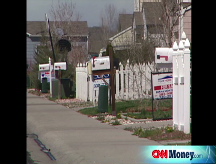House hearing spotlights mortgage rescue plans
The Committee on Financial Services looks at whether the banking industry is doing enough to help troubled homeowners.
NEW YORK (CNNMoney.com) -- Rep. Barney Frank, chairman of the House Committee on Financial Services, highlighted the need for a bailout program for troubled homeowners on Wednesday. But he stressed that not all borrowers should necessarily be rescued.
"Diminishing foreclosures is an important part of getting out of this [financial crisis]," said Frank, D-Mass., in an opening statement at a Congressional hearing on bank rescue plans for homeowners facing foreclosure.
But Frank added that taxpayer money should not be used to give anyone a "free ride," and warned that aid should not go to homeowners who never could have afforded their mortgage to begin with.
"There is, in my judgment, zero likelihood that taxpayer dollars will go to those who should never have had loans in the first place," Frank said.
Several major banks have recently launched programs to assist homeowners in danger of foreclosure.
On Tuesday, Citigroup (C, Fortune 500) said it would expand its Citi Homeownership Assistance Program in an effort to keep 130,000 troubled borrowers with mortgages worth $20 billion in their homes. The plan is similar to programs outlined by IndyMac Bank, which was taken over by the Federal Deposit Insurance Corp. this summer, as well as Bank of America (BAC, Fortune 500) and JPMorgan Chase (JPM, Fortune 500).
IndyMac launched a program in August to help 40,000 borrowers. JPMorgan has sad that it hopes to assist 400,000 homeowners by modifying loan terms or payments. Today, Bank of America said that it expects its housing rescue plan will help 630,000 troubled customers, a figure that is revised upward from its original estimate of 400,000.
The hearing featured testimony from Michael Gross, managing director of loan administration loss mitigation for Bank of America, and Molly Sheehan, senior housing policy advisor in the home lending division for JPMorgan Chase. Both executives detailed changes they are making to their workout plans.
Sheehan said JPMorgan Chase will "systematically review its entire mortgage portfolio" and proactively offer interest-rate reductions and other financing options to homeowners. The bank will also establish 24 new regional counseling centers in areas with high mortgage-delinquency rates.
JPMorgan Chase also intends to add 300 more loan counselors, bringing its total to 2,500. Sheehan said JPMorgan will "create a separate and independent review process with Chase to examine each mortgage before it is sent into the foreclosure process." Finally, she said, no additional loans will start the foreclosure process for 90 days, during which time the outlined changes will be implemented.
Gross said Bank of America is implementing a "proactive loan modification process" to provide relief to homeowners who are "seriously delinquent," representing roughly $100 billion worth of mortgages. This includes refinancing under the Hope for Homeowners program and interest rate reductions. The bank is also considering principal reductions on pay-option and adjustable rate mortgages in order to restore lost equity, Gross said.
Gross said that, through October of this year, loan modifications accounted for 75% of Bank of America's mortgage workouts, while repayment plans accounted for 12%. Loan modifications, which make the terms of a loan more affordable, are generally considered to be a much more effective means of keeping people in their homes than repayment plans, which simply give borrowers more time to make their original payments.
Tom Deutsch, deputy executive director of the American Securitization Forum, told the committee that while corporate foreclosure prevention efforts are critical to turning the market around, they "are not a panacea" for fixing the problem. He said he sees more work for the government ahead.
"In addition to expanded industry efforts, federal government initiatives such as Hope for Homeowners and the Troubled Asset Relief Program will have to be even more aggressive in their efforts to stabilize homeownership, neighborhoods and communities around the country," said Deutsch.
He added that expected housing prices to continue to decline throughout 2009 in "some of the more troubled markets," including California and Florida.
Borrowing a line from former Federal Reserve chairman Alan Greenspan, Deutsch blamed "irrational exuberance" for the imploded housing market, in addition to the economic downturn.
But even with these plans in place, Mark Zandi, chief economist for Moody's Economy.com, estimates that 1.6 million Americans will lose their homes this year through foreclosure or distressed sale. Zandi, who was not at the hearing, said that another 1.9 million families will lose their homes in 2009. ![]()


